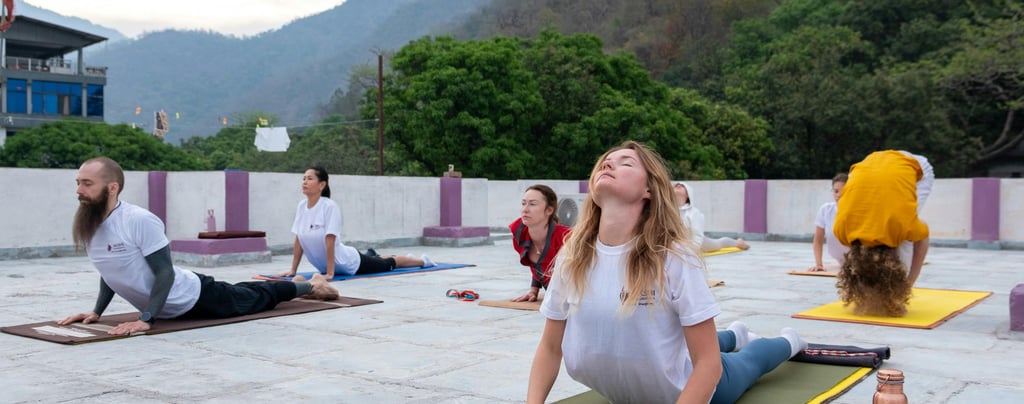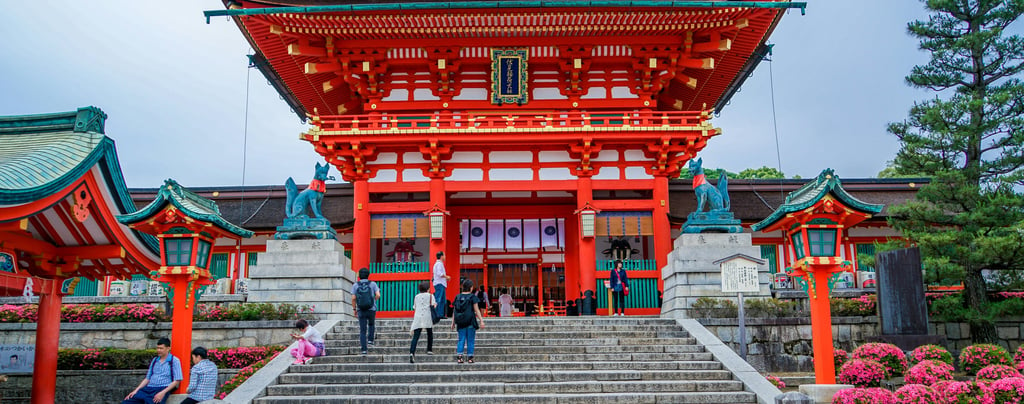Best Wellness Destinations in Japan : A Journey to Relaxation and Renewal
Best Wellness Destinations in Japan,Japan, a country renowned for its harmony, traditions, and natural beauty, is the perfect destination for those seeking wellness travel and rejuvenation.
12/16/20248 min read


Introduction
Japan stands out as a premier wellness travel destination, offering a blend of ancient traditions, natural beauty, and modern comforts that create an environment conducive to relaxation and rejuvenation. The country's unique approach to wellness is deeply rooted in its cultural ethos, which emphasizes harmony, balance, and a deep connection to nature. This philosophy manifests itself in various forms, from the serene landscapes adorned with tranquil gardens to the soothing, mineral-rich waters of its renowned hot springs, known as onsen.
One cannot traverse Japan without encountering the serene beauty of its natural surroundings, which play a crucial role in the wellness experience. The country is replete with picturesque mountains, lush forests, and tranquil coastlines, offering countless opportunities for outdoor activities such as hiking, meditation, and yoga. Each location provides a unique setting for introspection, promoting mental clarity and physical wellness. Additionally, the concept of forest bathing, or shinrin-yoku, has gained recognition for its therapeutic benefits, encouraging individuals to immerse themselves in the sights and sounds of nature.
Moreover, Japan's wellness retreats are designed to provide holistic experiences that encompass mind, body, and spirit. These retreats often feature traditional practices such as Zen meditation, Ikebana (flower arranging), and various forms of martial arts, allowing visitors to engage in authentic Japanese culture while promoting personal well-being. Culinary offerings in Japan further enhance this wellness journey, as the country's cuisine emphasizes fresh, seasonal ingredients that nourish the body while celebrating the artistry of food presentation.
In summary, Japan is not just a destination; it is a journey towards self-discovery and renewal, where ancient practices and natural beauty converge to facilitate profound relaxation. With its myriad wellness opportunities, Japan beckons those seeking tranquility and rejuvenation to embark on a transformative experience.
Exploring Japan's Famous Onsen Culture
Japan's onsen culture, deeply rooted in the country's history and traditions, offers a unique experience of relaxation and renewal. Onsen, which refers to natural hot springs, are spread throughout Japan and come in various types and settings. The majority of onsens utilize geothermally heated water, often infused with minerals, making them not only a source of comfort but also a venue for health benefits. The most common types of onsens include public baths, ryokan (traditional inns), and private baths, catering to diverse preferences.
The health benefits of immersing oneself in an onsen are widely recognized. The mineral-rich waters are believed to aid in the relief of muscle tension, improve circulation, and promote skin health. Various minerals found in onsen water, such as sulfur, calcium, and sodium, contribute to these therapeutic effects. Furthermore, the tranquil environment surrounding onsens fosters mental well-being, encouraging relaxation and stress relief. This combination of physical and mental rejuvenation makes onsen visits integral to Japanese wellness practices.
Culturally, onsens hold significant importance in Japan. They symbolize not only physical healing but also social interaction, as visitors often engage in conversation and foster relationships in these communal settings. Onsen etiquette, such as thoroughly washing before entering the baths and not submerging towels in the water, is strictly observed, adding to the unique cultural experience.
For those seeking picturesque onsen resorts, destinations such as Hakone, Beppu, and Kinosaki are among the most revered. Hakone offers stunning views of Mt. Fuji along with a variety of onsens that provide both indoor and outdoor bathing options. Beppu, known for its numerous hot springs and unique "hells," presents an opportunity to explore different types of mineral waters. Lastly, Kinosaki, with its charming townscape and seven public bathhouses, offers an immersive onsen experience steeped in tradition. Each of these destinations unveils distinct settings and experiences, ensuring that visitors engage in true relaxation.
Serene Zen Gardens: A Retreat for the Mind and Soul
Zen gardens, also known as karesansui, epitomize tranquility and are a profound expression of Japanese aesthetics and philosophy. These meticulously crafted spaces are designed to promote meditation and contemplation, offering visitors a serene environment that invites introspection and renewal. The philosophy behind zen gardens emphasizes simplicity, harmony, and the interconnectedness of nature and the human spirit. Each element is carefully curated to evoke feelings of calm and introspection, making these gardens ideal retreats for the mind and soul.
One of the most renowned zen gardens is the Ryoan-ji in Kyoto, where a simple arrangement of stones and white gravel serves as a canvas for meditation. The stark contrast of the rocks against the raked gravel encourages contemplation, allowing visitors to reflect on their thoughts and emotions. Each visit to Ryoan-ji can be a unique experience, as the perception of the garden evolves based on one's state of mind, providing a personal journey of peace and understanding.
Another notable zen garden is the Daitoku-ji, which encompasses multiple sub-temples, each featuring its own tranquil landscapes. Here, visitors can engage with nature pathways lined with moss, bamboo, and stone lanterns. The subtle sounds of flowing water gently enhance the ambiance, creating an immersive atmosphere conducive to reflection and solace. These gardens not only serve as a visual feast but also as a reminder of the importance of mindfulness in a fast-paced world.
For those looking to immerse themselves in the calming environment of zen gardens, attending guided meditation sessions or participating in a traditional tea ceremony can enrich the experience. These practices encourage visitors to truly connect with their surroundings, providing a deeper understanding of the beauty and significance of these serene spaces. A visit to Japan’s zen gardens is not merely an exploration of landscaping; it is an invitation to embark on a journey toward mental well-being and inner peace.
Traditional Japanese Ryokan Experience
The ryokan, a quintessential element of Japanese culture, serves as more than just a place to rest; it embodies a unique blend of hospitality, local cuisine, and a deep connection to nature. As travelers seek wellness and renewal, staying in a ryokan enhances their experience by providing immersive encounters with traditional Japanese life.
Hospitality in a ryokan is characterized by a warm, personalized approach. The concept of "omotenashi," or selfless hospitality, ensures that every guest feels valued and at home. Upon arrival, guests are often greeted with a welcoming cup of tea and a light snack, creating an immediate sense of comfort. The host's attentiveness to guests’ needs, coupled with the serene ambiance of the ryokan, fosters an atmosphere of relaxation that is conducive to wellness. The staff, typically well-trained in traditional service methods, are dedicated to ensuring that all aspects of a guest's stay are satisfying and enriching.
A signature feature of ryokan stays is the exquisite local cuisine, or "kaiseki." This multi-course meal is prepared with seasonal ingredients, reflecting the natural bounty of the surrounding environment. Each dish is an artful presentation designed to tantalize the senses, promoting both physical nourishment and an appreciation for Japan's diverse culinary heritage. By partaking in these meals, guests engage with the region’s food culture, which is closely tied to the principles of health and balance.
Furthermore, ryokans are often nestled in picturesque settings where nature plays an essential role in the guest experience. Many ryokans feature beautiful gardens, hot spring baths (onsen), and views of mountains or rivers, all of which promote relaxation and introspection. This connection to the natural world is vital for rejuvenation, as it offers a tranquil retreat from the hustle and bustle of modern life. Thus, choosing a ryokan is a pivotal step in any wellness journey in Japan, amplifying the overall experience through its harmonious integration of hospitality, cuisine, and nature.
Wellness Retreats: Modern Sanctuaries for Renewal
Japan boasts an array of wellness retreats that serve as modern sanctuaries, offering tranquility and rejuvenation in a serene environment. These retreats emphasize holistic approaches, integrating traditional practices with contemporary techniques to promote physical, mental, and emotional well-being. Nestled amidst picturesque landscapes, from the mountains of Hokkaido to the serene shores of Okinawa, these destinations offer a perfect escape for health-conscious travelers seeking renewal.
One of the most notable aspects of wellness retreats in Japan is their diverse range of programs designed to cater to various needs. Activities such as yoga and meditation are foundational elements, encouraging participants to connect body and mind. Many retreats incorporate traditional Japanese practices, such as Shinrin-yoku (forest bathing) and Ikebana (flower arranging), which further enhance the experience of mindfulness and self-discovery. Workshops on nutrition, herbal medicine, and stress management are also commonly offered, equipping guests with tools to maintain their health long after their visit.
Some top-rated retreats include the Ananda in the Himalayas, which combines wellness with luxury, offering personalized wellness programs and gourmet, organic meals. The Chiva-Som in Bangkok, while not in Japan, has made significant ties with Japanese wellness philosophies, showcasing how international retreats draw inspiration from Japanese practices. On the islands of Okinawa, known for its centenarian population, retreats often focus on longevity and healthy living, integrating local customs and diets into their programs.
As the understanding of wellness continues to grow, these retreats evolve to embrace new techniques while remaining deeply rooted in tradition. Japan’s wellness sanctuaries offer not merely a getaway but a transformative journey towards greater health and well-being, making them invaluable for those seeking to rejuvenate their lives.
Nature Escapes: Hiking and Outdoor Activities for Wellness
Japan is a country renowned for its breathtaking natural landscapes, which provide the perfect backdrop for wellness activities. Engaging in outdoor pursuits such as hiking and nature walks is not only a way to stay physically active but also an opportunity to rejuvenate one's mind and spirit. The beauty of Japan's mountains, forests, and coastlines invites individuals to immerse themselves in nature, fostering a profound sense of tranquility and renewal.
Some of the best hiking trails in Japan are found within its numerous national parks. For instance, the stunning trails within Shiretoko National Park in Hokkaido offer unique opportunities to explore diverse ecosystems, from lush forests to dramatic coastlines. The workload of ascending the trails is balanced by the rewarding views of stunning landscapes, including the spectacular sight of the Sea of Okhotsk.
In addition, the Japanese Alps are another iconic destination for hiking enthusiasts. The steep ascents and serene mountain lakes provide an environment that encourages mindful contemplation amid nature's beauty. Popular routes, such as the Nakasendo Trail, allow hikers to experience both exercise and cultural exploration, as it winds through historic post towns and rice paddies.
Beyond hiking, Japan's natural hot springs—known as onsen—offer an additional dimension of wellness. After a day of vigorous outdoor activity, soaking in these mineral-rich waters can significantly enhance relaxation and recovery. The combination of physical exercise and restorative experiences in nature promotes overall well-being, allowing visitors to harmonize their body and spirit.
Ultimately, the synergy of Japan’s natural amenities and outdoor activities creates a holistic approach to wellness that is both accessible and transformative. Whether trekking through rugged terrain or simply enjoying a peaceful nature walk, participants are sure to find relief from the stresses of everyday life while reconnecting with the beauty of the natural world.
Food for the Body and Spirit: Japanese Cuisine as a Wellness Journey
Japanese cuisine, characterized by its emphasis on fresh ingredients, balanced nutrition, and presentation, serves as a holistic approach to wellness. The philosophy of 'shoku,' or food, underscores the idea that eating healthy is not merely about sustenance, but also about nurturing the spirit and fostering a harmonious lifestyle. This framework promotes an understanding of food as a key part of well-being, blending nutritional value with cultural significance.
A crucial component of Japanese cuisine is 'ichiju-sansai,' meaning one soup and three sides, which collectively create meals that are visually appealing and nutritionally balanced. This dietary practice encourages the consumption of a variety of ingredients, including rice, vegetables, fish, and miso, providing essential vitamins, minerals, and omega-3 fatty acids vital for cognitive and physical health. With dishes such as sashimi, which features fresh fish rich in nutrients, and seasonal vegetables prepared in a light but flavorful manner, Japanese food fosters both body health and culinary enjoyment.
Furthermore, traditional Japanese meals often incorporate fermentation processes, as seen in foods like natto and pickled vegetables. This not only enhances the flavor profile but also contributes probiotics, which can improve gut health and overall body function. The mindfulness associated with meal preparation and consumption in Japanese culture can significantly enhance one’s mental state, encouraging a sense of calm and satisfaction.
Several influential restaurants throughout Japan prioritize wellness by staying true to these principles, creating menus rooted in health-conscious practices while celebrating local ingredients. Such establishments embody the philosophy that dining can be both an art and a pathway to greater health, making Japanese cuisine a remarkable journey that nourishes both the body and the spirit.
Follow me on Medium for more wellness travel guides and tips!




Explore
Inspire your wellness journey while traveling the globe.
Wellness
Travel
+1234567890
© 2024. All rights reserved.
